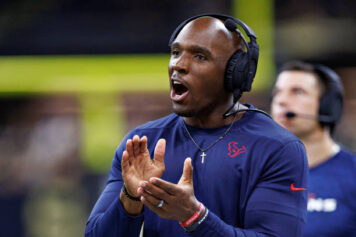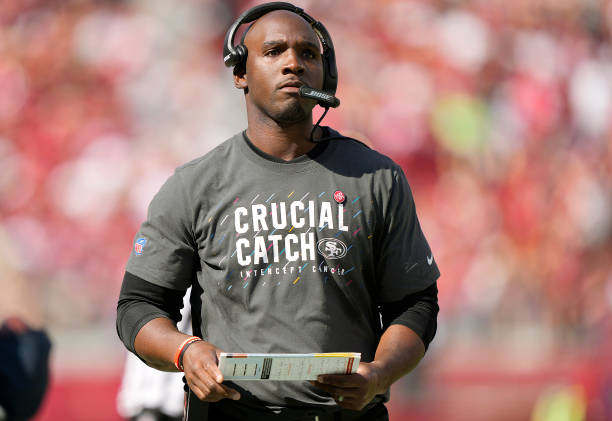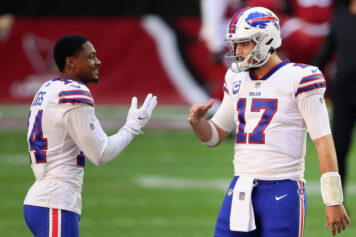Award season in entertainment is the closest equivalent to the summer of drafts in the Big Four sports. Just as top nominees awkwardly squirm while cameras capture their stoic emotions as presenters open an envelope containing the winner’s name, Commissioner Goodell will work up a sweat walking to the podium announcing the names of 2014 NFL Draft picks. There’s a lot more on the line than recognition for NFL prospects though. These are their livelihoods.
Contrary to Phil Simms’ asinine assertion that Geno Smith would be the first quarterback taken in 2014, this class is vastly superior to the 2013 edition. If Smith’s NFL matriculation were delayed by a year, he might not get off the board until the third day.
As the next three months tick off the remaining clock before the 2014 NFL Draft, discussion over the Texans No. 1 overall pick has shifted to a two-way battle between Johnny Football and Jadeveon Clowney. Remarkably, most prognostications are leaning towards Manziel who was receiving third round grades midway through the season.
Most states have a state motto, a state bird, a state flag or any other miscellaneous representative characteristics that distinguishes them from their other 49 neighbors. Texas self-identifies with the pigskin and gridiron as much as New York City does hoops. Except Texas does it on a much larger scale.
At the pro level, the Dallas Cowboys have built their cache on their credentials as “America’s Team”. The franchise 263 miles northeast of Jerry’s World seems to operate as Texas’ unofficial state professional football franchise.
Manziel is just the most recent state mascot/local celebrity that fans have begun lobbying to keep in-state. Seven years ago, Texan fans were campaigning for Vince Young’s selection after his Rose Bowl performance. The clamoring completely ignored the major flaws in his throwing motion and passing under center in favor of his size and electrifying running ability. The mid-2000s were a different team—or so we thought.
When Charlie Casserly invested in a 290 pound defensive end from NC State over Reggie Bush and Young in 2006, there was a near insurrection in the Lone Star State.
The pressure for Texans general manager Rick Smith to select Manziel would be ear-splitting if Young’s career hadn’t fizzled out. Owner Bob McNair, a native Texan fell in love with local celebrity Vince Young and has developed a similar bro-crush on Manziel. Mel Kiper Jr. rates Teddy Bridgewater as the top quarterback prospect, but is convinced in his mock drafts that Manziel will be the pick.
Noticeably absent on the tongues of pundits and analysts is the Louisville Slinger. Bridgewater isn’t a sexy prospect. If Manziel was Macklemore on Grammy night, Johnny Football may be sending Bridgewater an apologetic text after Day 1 of the draft in May. Kendrick Lamar’s snubbing for Best Rap Album to Macklemore was a win for commercialism and hype over raw music.
From the lack of buzz, it would create the impression that Bridgewater is being set up for an Aaron Rodgers-type plummet on Draft night and trip home more disappointing than K. Dot's empty-handed haul. And yet, the media's treated the best quarterback prospect in this draft like a tree falling in a forest.
Pocket quarterbacks don’t have much cultural cache. As I wrote this summer, black pocket quarterbacks barely register and there’s an eerie fog of uncertainty around Bridgewater that belies his talent level. Manziel is the offensive shot of adrenaline, Blake Bortles is the developmental superstar, Clowney is the heart of the defensive lover’s crowd and Bridgewater is the vestigial tailbone.
Bridgewater doesn’t come with all the bells and whistles, but he is a unique prospect. He didn’t play in a gadget offense, his personality isn’t very dynamic and he isn’t repped by Roc Nation or LeBron and Friends. That may explain part of the reason he’s been overlooked as draft narratives have quickly honed in on Manziel and Jadeveon Clowney as the Texans only logical choices for the first pick while Bridgewater languishes in the peripherals.
Despite being labeled as he preeminent dual-threat prep prospect in the Class of 2011, he rarely broke the line of scrimmage compared to his peers and should have been considered a pure passer by the rankings systems.
Peyton and Andrew Luck were created in the labs of Houston Oiler quarterbacks Archie Manning and Oliver Luck. Bridgewater doesn’t progenate from any NFL lineage and wasn’t reared by a quarterback guru during his three years at Louisville. He’s a self-made quarterback savant. Since his true freshman season at Louisville, Bridgewater was in charge of making pre-snap reads and calling his own plays at the line for Louisville’s offense.
Bridgewater was responsible for an audible system at Louisville that resembled Peyton Manning's autonomy at the offensive line. After the snap, Bridgewater was asked to read the entire field and go through actual progressions. Bridgewater's offense wasn't a smokescreen built on zone reads, bubble screens and underneath routes like the one executed by Oregon’s Marcus Mariota.
“I study pro ball, that’s what I do, that’s my passion, my love. (NFL coaches) are the best at what they do, so I’ve made it what we do,” Louisville’s former offensive coordinator Shawn Watson told MMQB. “Most of these kids in college, the coordinator calls it from the press box and then there’s a signal system once the defense declares. The quarterback never gets developed, never gets taught. Teddy’s been taught from day one that I want him to be the coordinator at the line of scrimmage because he can be far better than me. And he can put the ball wherever he thinks is right.”
Scouts are drawn to pinpointing deficiencies in quarterbacks identified as elite prospects, but in four months, Bridgewater did what Matt Leinart, Matt Barkley and Brian Brohm could not by holding off Mariota’s rush and sustaining his rep as the upcoming draft’s top signal caller prospect.
The unvarnished truth about Johnny Manziel is that that his collegiate numbers were partially inflated by A&M’s pace and the system. If the Texans do draft Manziel, he’ll be plugged in to replace Kevin Sumlin’s previous record-setting quarterback, Case Keenum. Before Sumlin took the A&M job, Keenum became the NCAA’s career-leader in passing yardage and passing touchdowns. Manziel is obviously more skilled than Keenum, but Air Bud could have thrown for 3,000 yards in the Air Raid attack Sumlin (and Art Briles) installed at Houston and A&M. In addition to facing bigger, stronger linebackers, Manziel, like most spread option quarterbacks will also have to adjust to moving with less spacing because of the NFL's narrower hash marks.
Manziel isn’t your typical gunslinger from the pocket. The Aggies legslinger is one of the most talented quarterbytes to come down the collegiate pipeline since Doug Flutie was throwing dimes at Boston College, but his rising draft status from likely third-rounder to prospective No. 1 overall pick is a testament to Russell Wilson’s impact on the NFL’s copycat culture. Manziel is two inches taller than Wilson, and slices up fields with his strides just as well, but his propensity for committing turnovers became an issue during his redshirt sophomore season. He’s fundamentally unsound, which makes him a major risk to run an offense predicated on routine and precision.
A quick pat-down of his skillset uncovers 4.68 speed and a preternatural ability to thrown on the run while avoiding, but as electrifying as Manziel’s playmaking instincts are, there’s a steadiness lacking in comparison to Wilson and Bridgewater. Everyone thinks they want an exciting quarterback these days. The thinking behind Manziel’s selection is that wherever he goes, he’ll immediately put butts in the seats. It’s the same logic that nearly prompted the Texans to take Vince Young.
“Electrifying” quarterbacks can cause the hair on your head to stand up at any time, but they can also have you pulling it out. They occasionally get drunk improvising big plays like fratboys over a keg and make bad decisions. It takes exceptional physical ability and discipline to entrust your offense with a moving quarterback. Manziel hasn’t proven he can be that exception. Pocket passers methodically dissect defenses inches away from the trenches, but are more predictable.
Bridgewater's no Byron Leftwich mobility-wise. He just preserves his off-road tires for when it's absolutely necessary to use them.
Manziel won’t be able to replicate his formula of swerving around defensive linemen in the backfield long enough to lob a jump ball into the arms a wideout not named Mike Evans for an entire NFL season. The ability to generate positive yardage when a play breaks down is an asset, but a more vital trait is being able to go through first, second and third progressions quickly and subtly look off defenders when a play is executed as planned.
There’s a delineation between mobile quarterbacks and scrambling quarterbacks. Scramblers often eschew the fundamental throw for exciting, but risky adlibs. Over the course of a season, that sort of daredevil mentality takes a toll.
There is no precise formula for scouting quartebacks successfully, but collegiate production is just a portion of that equation. How they translate, release point and the ability to speed read defenses all matter equally.
The career arcs of Michael Vick, Robert Griffin III, Russell Wilson, Colin Kaepernick and Cam Newton have been lazily cited as trope models for Manziel’s career, but they don't pass the smell test. Vick arrived on the pro scene as the NFL’s Iverson to change the state of the quarterback, but is on the other end of the Russell Wilson quarterbyte spectrum. Vick’s 4.3 speed and the bazooka mounted atop his shoulder separated young Vick from young Manziel. RGIII ran his 40 nearly .2 of second faster, has nearly three inches of vertical height, on Manziel and a stronger arm. Those fractions of a second and size differences make a difference in the NFL.
The purpose here isn’t to throw shade on Manziel. He’ll experience that reprieve from the beating sun after he takes a snap underneath a 6’4, 6’5 center for the first time. It’s to highlight the inconvenient truth that he’s not the top quarterback available.
Manziel could wind up as a Russell Wilson clone, but nothing he’s exhibited so far demonstrates the type of discipline on or off the field to defy the odds. There are too many qualifiers associated with Manziel. Franchise players change losing cultures. From the sounds of it, Manziel has to be surrounded by just the right situation to excel.
History repeats itself in intriguing ways. On the flipside of the consensus debate over the Texans No. 1 pick is whether they’re focusing on the wrong side of the ball. South Carolina’s Jadeveon Clowney is a physical specimen whose measurable casual fans have fallen in love with.
After he ran a 4.47 at the combine, 10 pounds lighter than his playing weight, Clowney’s underwhelming junior season was written off as a byproduct of team’s double teams, injuries and offensive coordinators playing keepaway by running plays to the other side of the field. In that regard, he sounds like the Richard Sherman of the defensive line. However, there are legitimate concerns about his technique and sparse reservoir of pass rushing moves.
Clowney may be great one day, but the idea of passing on an elite quarterback prospect for an equally unproven and great defensive linemen is a ridiculous sentiment. Last season, he would have gone number one when Geno Smith was the Denny’s quarterback discount special. The Texans have already experimented with two dominant pass rushers putting the squeeze on opposing quarterbacks when rookie J.J. Watt bookended Mario Williams. Outside of Lawrence Taylor, has a pass rushing outside linebacker ever been quick fix for a Super Bowl winning franchise without a quarterback?
As unstoppable as Reggie White’s weekly Sunday quarterback baptisms were, it wasn’t until he was paired with Brett Favre that his ring finger complete a few reps with a 225 pound studded Super Bowl ring. Same went for Michael Strahan. The Ravens’ juggernaut defense learned this lesson when they shuffled from Elvis Grbac to Kyle Boller and an aging Steve McNair after their Super Bowl win in 2001 courtesy of a once in a generation defense.
Bridgewater’s athletic, but doesn’t display blistering speed. Bridgewater more closely resembles the Boston Globe’s Michael Holley than an iconic quarterback, however, his mental acuity, football IQ, eye manipulation on throws and mobility give him the edge as a prototypical pocket passer who can stare down the barrel and take a hit with ingredients of a roll-out passer who can extend plays.
Teddy Bridgewater's doppleganger (Michael Holley) is back co-hosting @ESPN_Numbers picking Clowney as top prospect. pic.twitter.com/D6xVyizuyU
— DJ RedHerring Dunson (@CerebralSportex) February 28, 2014
Bridgewater’s upside projects to a more NFL-ready Aaron Rodgers. On Draft Day nine years ago, the San Francisco 49ers passed on Rodgers with the No. 1 pick because of perceived personality differences between he and head coach Mike Nolan. He proceeded to sit there for another agonizing 23 picks.
New Texans head coach, Bill O'Brien doesn’t operate a distinct system that favors particular quarterback styles, but he does have an okQBCupid profile of the type of quarterback he wants to put his franchise into.
“The ability to be obsessed with football, you have to love football. Be willing to study it day in and day out off-season, during the season, mini-camp, training camp, obviously you really don’t take time off from the game to be a great quarterback. You have to be an accurate passer, you have to be a guy who can stand in there and take a hit, you got to be a good leader on your team, you have to be a great teammate a guy that is willing to stay there after practice to work on a certain route and a certain run game polish or something like that. I think there is a lot of factors to be a great quarterback.” O'Brien gushed in early January.
From the sound of it, O'Brien’s describing the Louisville Slinger who has been described as a football savant. Texans execs would be wise not to have Bridgewater waiting past the No.1 pick.
Bortles was groomed by one of O’Brien’s mentors at Central Florida (George O’Leary) has immaculate size, a big arm and while he does have small hands like Bridgewater, his pimp hand is Brady-like. However, he’s as much of a project as Manziel. Clowney may be Von Miller bitten by a radioactive spider, but great middle linebackers like Brian Cushing and Patrick Willis are the wind in the sails of most juggernaut defenses, not pass rushers.
Bridgewater’s only major flaw besides his slight frame is that there is no spectacle or urban legend surrounding his profile. Nevermind that he has six more months to gain 10 pounds, which is much simpler than Bortles and Manziel task of coming to grips with NFL offensive concepts for the first time in their lives. By comparison to Manziel, Bridgewater makes Tim Duncan sound wackier than a Real Husbands of Hollywood plotline.
Without a juicy storyline to nitpick, Bridgewater’s dropped out of the media’s No. 1 pick conversation. His efficiency has been confused with a lack of an upside despite him being two years younger than Bortles, nine months younger than Clowney and a month older than Manziel.
Listening to the omission of Bridgewater during the pre-draft process is like watching the Grammys eschew quality substance for flash. Celebrity and combine numbers seem to be winning out over pure football. Teddy Bridgewater is a good kid and Houston is a football M.A.A.D city. If the Texans value wins over generating cheap, contrived offseason ticket sales and revenue, Teddy B is their man.



